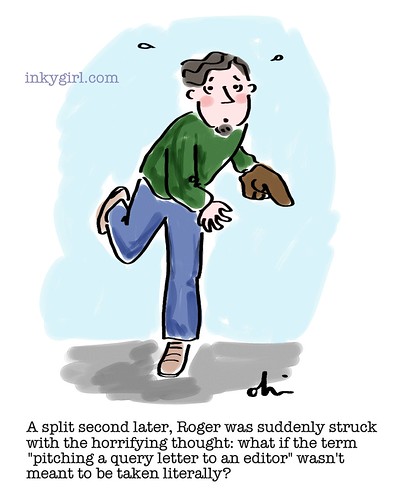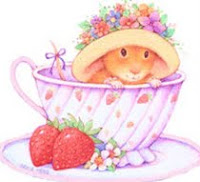We've all heard the term the "dreaded synopsis", right? Yes, that horrible beast of thing you have to write summarizing a whole 100k book into just a few scant pages. I know I'm not the only one who queried the agents who didn't require a synopsis first just so I could avoid writing the damn thing. (Tell me I'm not the only one who did that.)
I mean, what's to like about the thing? You have to cut out parts you want to put in, your voice can get drained because you have so little room to work with, you don't have space to talk about that kickass secondary character you worked in. God, why do agents/editors put us through this form of torture? *insert melodramatic music here*
Okay, so I thought all those things. Every time I had to write a synopsis for a completed book I wanted to bang my head with a blunt object. It was painful. The writing, not the banging, I didn't actually do the blunt object thing.
So when I got my *cue angels singing* book deal, I thought--yay, down with the queries and synopses for-evah!
WRONG.
Queries and synopses NEVER go away, dude. They just get called different things. The synopsis becomes a proposal and then the query becomes writing your back cover copy. (Yes, you will end up writing most of your back cover copy because the marketing department hasn't read your book so inevitably aren't going to get the blurb just right.)
And guess what, with proposals, now you have to write your synopsis BEFORE YOU WRITE THE BOOK. *plugs ears to block out the collective screams of pantsers everywhere*
As a pantser, I can tell you I was absolutely terrified of doing this. I don't plot ahead. I don't know what the story is going to look like until I write it. I actually was trying to figure out how I could write the book really fast just so I didn't have to write up a proposal. But alas, I'm not that fast of a writer. And yes, it'd actually be kind of nice to get a book deal and confirmation that said book will be published one day before I write the actual book.
So after going to a few workshops on writing synopses, off I went to draft synopses for books 3 and 4 with deep fear in my heart.
And guess what I discovered?
Writing them before you've written the book is SO MUCH EASIER. Like wow. Like I finished one synopsis each day. For reals.
And I realized all this time why writing them after is so hard. After you've finished the book, you know every little detail and nuance of your story. You have a buttload of information you're trying cut down to the bones. But all that content can overwhelm you. You can lose perspective on what is most important to get across.
However, when you try to draft it before you've written the story, all you can do is write it in broad strokes. You don't know the details yet, so you only focus on the big turning points. And bam--there's your synopsis.
I'd heard of people writing queries before writing their books and thought that was nuts, but now I get it. You're not locking yourself into some strict guideline like an outline would. You're just giving yourself a general map. You put yourself on the right highway even though you may take unexpected side streets along the way. It's really been a revelation to me.
So here are my...
Five Quick and Dirty Tips For Writing a Synopsis
1. Try writing it before you write your story--even if you're a pantser. (Haven't you been listening to my testimonial? "This is life-changing, man"--she says in her Cheech & Chong voice)
2. Set aside a paragraph each for your two (or three) main characters at the beginning and fill in their backstory.
This was something I learned in the workshops I went to. We often get bogged down in the synopsis because we're in present tense and trying to work in the characters' backstories at the same time, which makes things feel disjointed. So just pull the backstory out as a separate thing. You can structure the synopsis like this:
- Hero--His backstory and the important little tidbits about him (one paragraph)
- Heroine--Her backstory and a few things about her. (one paragraph)
- Antagonist/Villain/Etc--one paragraph
- Summary: "As the story opens..."<--This is where the summary starts. Your opening. You can focus on the action now that the backstory is already fleshed out.
3. Don't worry about subplots and all your secondary characters.
Stay focused on the main plot thread, goal, motivation, conflict, and characters.
4. Don't lose your voice.
I went to one workshop where the presenter said you pretty much have to lose your voice in a synopsis. I totally disagree. I have read and written some very voice-heavy synopsis and think they're more compelling that way. (Note: This is not writing the summary in the voice of your character, but in your author voice and style. If your story is dark and ominous, your synopsis should read that way as well.)
5. Get in and get out.
Yes, you'll read on some websites that a synopsis can be one page for every 20 pages of prose. Well, really, who wants to write and/or read that long a synopsis? If I wrote one that long, I'd no longer want to write the story because I would've already told it (the pantser flaw.) You can summarize a full-length novel in 1-5 single-spaced pages in my opinion. My synopsis generally run about 2-3 pages. If you're venturing into 8-10 page land, you haven't cut it down to the most important parts yet.
So there, try those things and I bet you'll be able to scratch out that "dreaded" that always precedes the word "synopsis". You may even find it *gasp* fun like I did.
So how do you feel about the synopsis? Have you ever tried writing one before you write the story? If so, are you a plotter or pantser? What tips do you have that help you write a synopsis?







